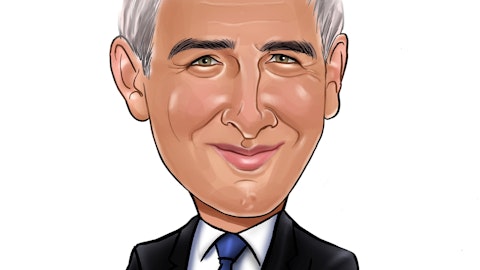Horizon Kinetics LLC, a New York-based investment advisory firm founded in 1994, released its Q1 2020 Commentary – a copy of which is available for download here. It has over 70 employees and is led by Murray Stahl. Its investment strategy is long-term and contrarian oriented, and the fund usually holds a concentrated portfolio with original stock picks.
In the said letter, Horizon Kinetics highlighted a few stocks and Intercontinental Exchange Inc (NYSE:ICE) is one of them. Intercontinental Exchange owns exchanges for financial and commodity markets. Year-to-date, ICE stock lost 1.0% and on April 28th it had a closing price of $90.29. Its market cap is of $50.3 billion. Here is what Horizon Kinetics said:
“We also lately added another securities exchange, Intercontinental Exchange. As you would expect, it has remarkably high profit margins compared with an ordinary service or manufacturing business. Its after-tax free cash flow margin last year was 66%. One might ask why the need for another securities exchange if the portfolio already has two, the CME Group and the CBOE.
Different exchanges have different specialties and exposures. CME’s largest product line, for instance, is interest rate products, which account for about a third of its transaction and clearing revenues, followed by equities. Intercontinental Exchange, on the other hand, gets almost 40% of its revenues from energy futures and options. About 10% of revenue is from agricultural and metals commodities. Those include sugar, coffee, cocoa, and cotton. Metals includes not just gold and silver, but iron ore. The CME got about 7% of its revenues from agricultural commodities products last year, but its key commodities were different: corn, soybeans and wheat.
You can see how much simpler this is. Goodness knows how to figure out which companies and business might be impacted by one sort of input cost pressure or another, whether it will be steel or coffee or energy or interest rates. The futures exchanges benefit from all of that, if volumes and prices are rising. A little bit like choosing between one airline company or the company that provides planes for all airlines.
There’s another aspect of Intercontinental that has optionality if you’re concerned about a global bout of central bank money creation. At the end of 2018, Intercontinental founded a new entity called Bakkt, which includes, as partners, BNY Mellon, Microsoft, and Starbucks. What complementary faculties would the country’s largest securities exchange, largest custodian bank, largest software company and largest coffee shop chain have that would induce them to work together? Bakkt’s goal is to provide a comprehensive digital asset and cryptocurrency financial service platform. In 2019, with approval from the CFTC, Bakkt launched physically delivered Bitcoin Futures, Bitcoin Monthly Options, and Bitcoin CashSettled Futures. It also established a NY State Dept. of Financial Services regulated custodian to provide Bitcoin custody services to Institutional clients.
The Bakkt consortium has also been developing a mobile phone app, essentially a digital wallet, using “Bakkt Cash”, which can include bitcoin. That app has been in beta testing and is expected to launch a consumer app and merchant portal in the 1st half of 2020.”
In Q4 2019, the number of bullish hedge fund positions on ICE stock increased by about 6% from the previous quarter (see the chart here).
Disclosure: None. This article is originally published at Insider Monkey.



